Learning development has become a top priority in the rapidly evolving landscape of business. Organizations today are increasingly turning to technology to help enhance learning and development. One of the most significant innovations in this space is enterprise LMS development, a platform designed to facilitate, manage, and track employee training and development. These systems help in driving efficiency, engagement, and organizational growth.
But what exactly is an Enterprise LMS? What are its features and advantages? In this blog, we’ll explore everything you need to know about Enterprise Learning Management Systems, including emerging trends, challenges in development, and real-world use cases.
An Enterprise Learning Management System (LMS) is a software application that facilitates the administration, tracking, and delivery of educational courses and training programs within an organization.
Unlike traditional learning systems, which may be used in academic institutions or for small-scale eLearning, an Enterprise LMS is designed to handle the complexity, scale, and unique needs of large organizations with diverse workforces.
The purpose of the Enterprise LMS development platform is to provide a centralized platform for managing employee learning and development. This includes onboarding new employees and offering skills training, compliance education, certifications, and professional development programs.
The system helps organizations track learners’ progress, assess the effectiveness of training, and measure return on investment (ROI).
The key features of an Enterprise LMS development platform can vary depending on the organization’s needs, but the most common include:
The core function of an LMS is to create, manage, and deliver training programs. This includes organizing content into courses, modules, or lessons that employees can easily access and complete with enterprise lms software.
Enterprise LMS systems allow administrators to manage users by creating learner profiles, assigning roles (e.g., manager, employee, admin), and tailoring content for different groups.
Tracking learner progress is crucial for any training program. Enterprise LMS systems provide detailed reports and analytics to track course completion rates, learner performance, and engagement metrics.
Enterprise LMS platforms often include assessments, quizzes, and exams to evaluate learning outcomes. They also issue certifications upon successful completion, which can be crucial for compliance or skill validation.
Enterprise LMS platforms support social learning through discussion forums, message boards, and collaboration tools. These features foster peer learning and create a more interactive learning environment in learning management system development. These tools can also be tailored to support different types of learning styles, ensuring that each learner absorbs and applies knowledge most effectively.
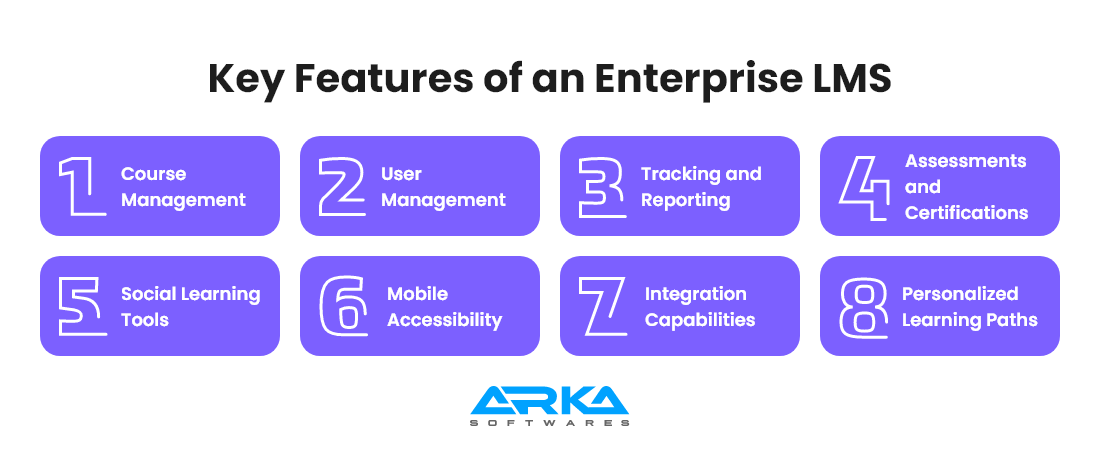
In today’s fast-paced world, employees are constantly on the move. Mobile compatibility allows users to access training content anywhere, anytime, making learning more flexible.
Modern LMS solutions can integrate with other enterprise systems, such as Human Resource Management Systems (HRMS), Customer Relationship Management (CRM), and Performance Management systems.
This ensures a seamless learning experience with learning management system development.
Personalization is a significant aspect of an Enterprise LMS. These platforms often use data analytics to suggest courses or training paths based on an employee’s role, skill gaps, or career aspirations.
Read More: How to choose the right LMS?
There are several significant advantages for an organization for developing a custom Enterprise LMS development:
A custom LMS can be scaled to fit the growing needs of a business. Your LMS can grow alongside your organization, whether you’re adding new employees, locations, or products.
A custom LMS can be designed to meet the unique learning requirements of your workforce, whether you’re in healthcare, manufacturing, or technology. Tailored courses, assessments, and content make the system more relevant and effective.
A custom LMS can improve employee engagement with training programs by offering a user-friendly, engaging platform. Interactive features of custom enterprise LMS, such as gamification, multimedia content, and social collaboration tools, make learning more enjoyable.
While the initial development of a custom LMS may require investment, it can reduce training costs over time. It eliminates the need for external training vendors and allows organizations to create in-house learning materials to be reused with learning management system development.
With learning management system development, organizations can track learner behavior and gain valuable insights into the effectiveness of their training programs. This data can improve future training initiatives and ensure alignment with business goals.
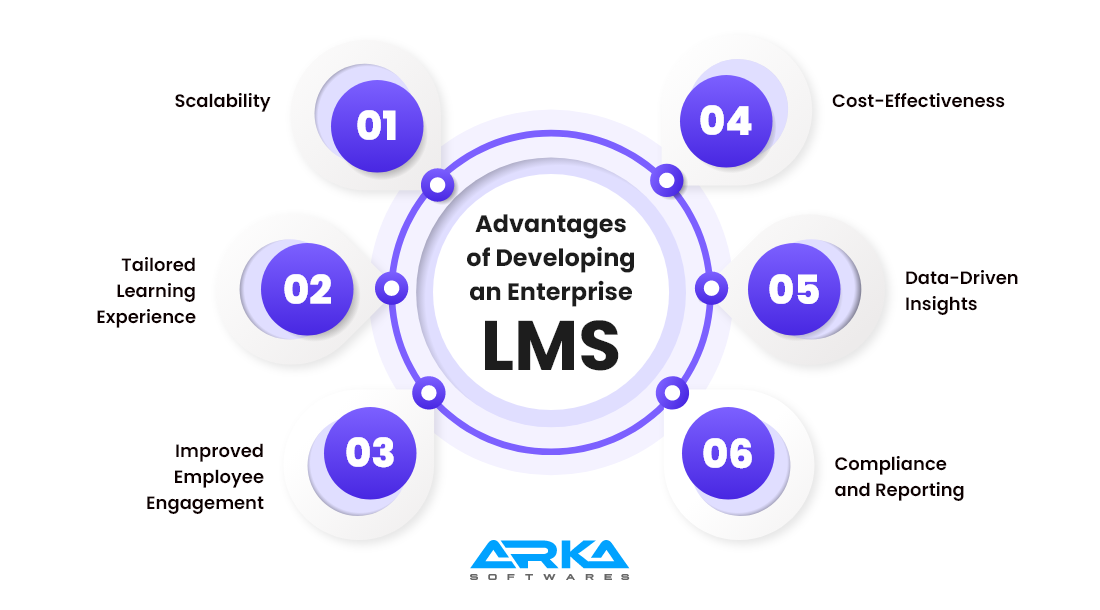
Many industries have strict regulations that require employees to undergo specific training regularly. A custom LMS can help ensure compliance with industry standards and provide detailed reporting to prove adherence as benefits of learning management system.
The field of Learning Management System development is evolving rapidly, and several emerging trends are shaping the future of enterprise learning:
AI and machine learning are revolutionizing enterprise LMS platforms by enabling personalized learning experiences. These technologies help create dynamic learning paths, recommend content based on an individual’s performance, and even automate administrative tasks.
Microlearning involves delivering content in small, digestible units that employees can consume. It has become a popular trend because it fits into the busy schedules of modern employees and allows for better information retention.
Incorporating game-like elements into the learning experience, such as leaderboards, badges, and points, enhances employee engagement and motivates learners to complete their training programs.
VR and AR are increasingly used in training programs to create immersive learning experiences, particularly for healthcare, manufacturing, and retail industries. These technologies help employees practice skills in realistic, risk-free environments.
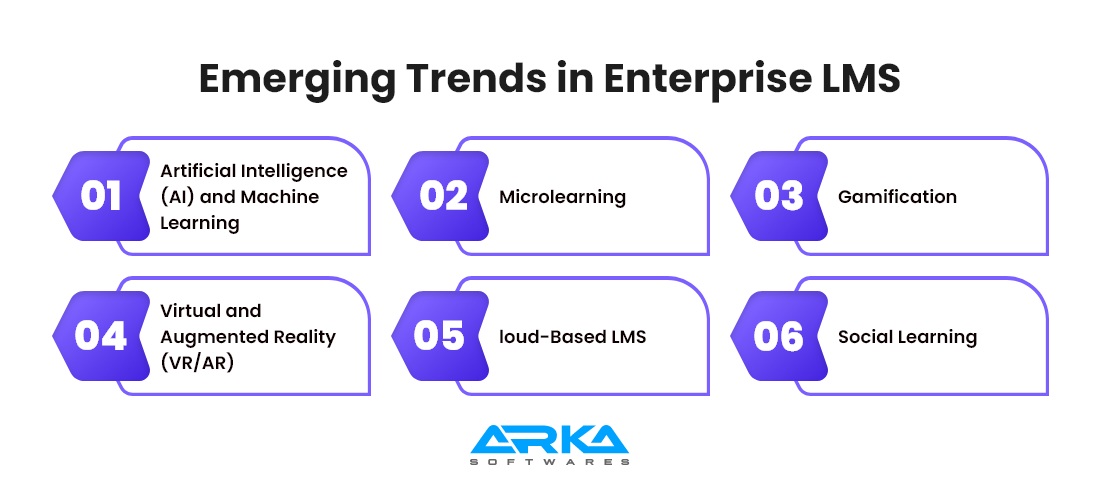
Cloud-based LMS platforms offer flexibility, scalability, and ease of access. With cloud-based solutions, organizations don’t need to maintain on-premises infrastructure, which makes it a cost-effective choice for many enterprises.
Collaborative learning environments, such as social forums, blogs, and communities, are gaining traction. These platforms allow employees to share knowledge, ask questions, and learn from each other, creating a more connected workforce.
Read More: eLearning app development: A Complete Guide
Integrating an LMS with other enterprise learning management systems is essential to streamline business operations. Here are a few key integrations:
Integrating with HRMS allows for automated user management, such as syncing employee information, role-based course assignments, and performance tracking.
An LMS integrated with CRM systems can provide training specific to customer-facing employees, helping them stay current with product knowledge and customer service techniques.
Integrating SSO simplifies the login process by allowing users to access the LMS using their existing enterprise credentials. This enhances security and user experience.
Integration with video conferencing tools, such as Zoom or Microsoft Teams, enables live virtual classrooms, webinars, and instructor-led training.
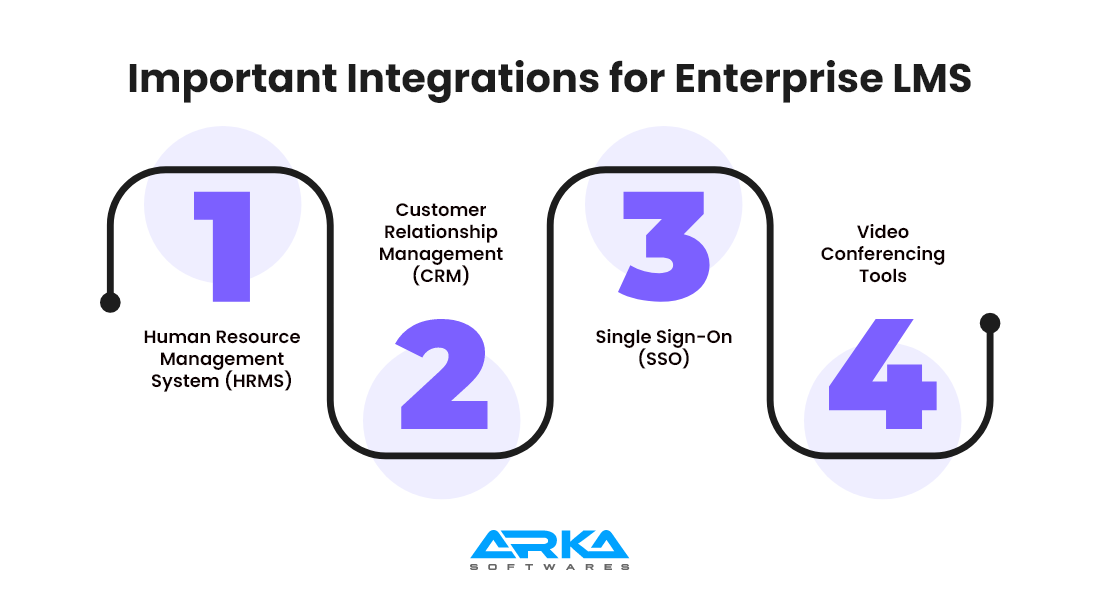
Developing a custom enterprise learning management system requires careful planning and execution. Here’s an overview of the key steps involved:
Identify your organization’s specific learning and development needs. Understand the challenges employees face and how the LMS can help address them.
Choose between developing a web-based, mobile, or hybrid LMS, depending on your organization’s needs and the training you plan to offer.
Collaborate with LMS developers to design an intuitive user interface, integrate required features, and ensure the platform is scalable and secure.
Integrate the LMS with other enterprise systems to ensure data flows seamlessly between platforms.
Conduct thorough testing to identify and fix any bugs or issues before the LMS is launched.
Launch the LMS and train employees on how to use the system effectively.
Review the LMS’s performance regularly, gather user feedback, and make necessary improvements to ensure it meets organizational goals.
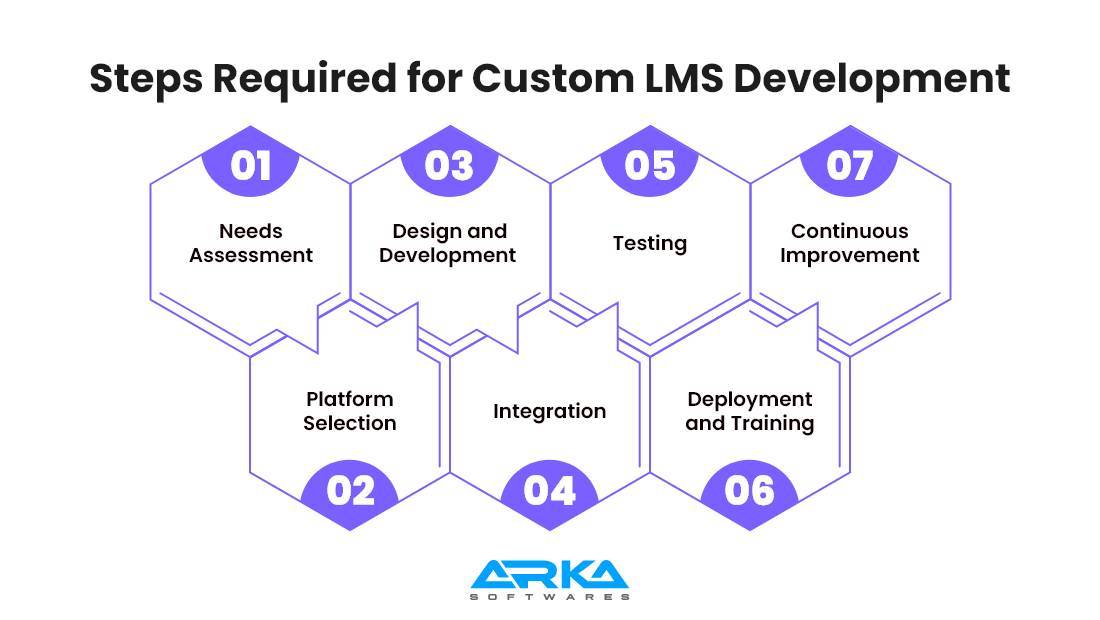
Developing an Enterprise LMS comes with its challenges:
Tailoring an LMS to fit an organization’s needs can be complex, particularly for large, diverse organizations with different departments and roles.
Developing a custom LMS involves significant upfront costs, including development, testing, and integration with existing systems.
It can be challenging to take the time to adapt and consistently use the new LMS. Proper onboarding and ensuring the system offers an easy and engaging user experience are crucial.
Since LMS platforms handle sensitive data, ensuring the system is secure and compliant with data privacy regulations is a significant concern.
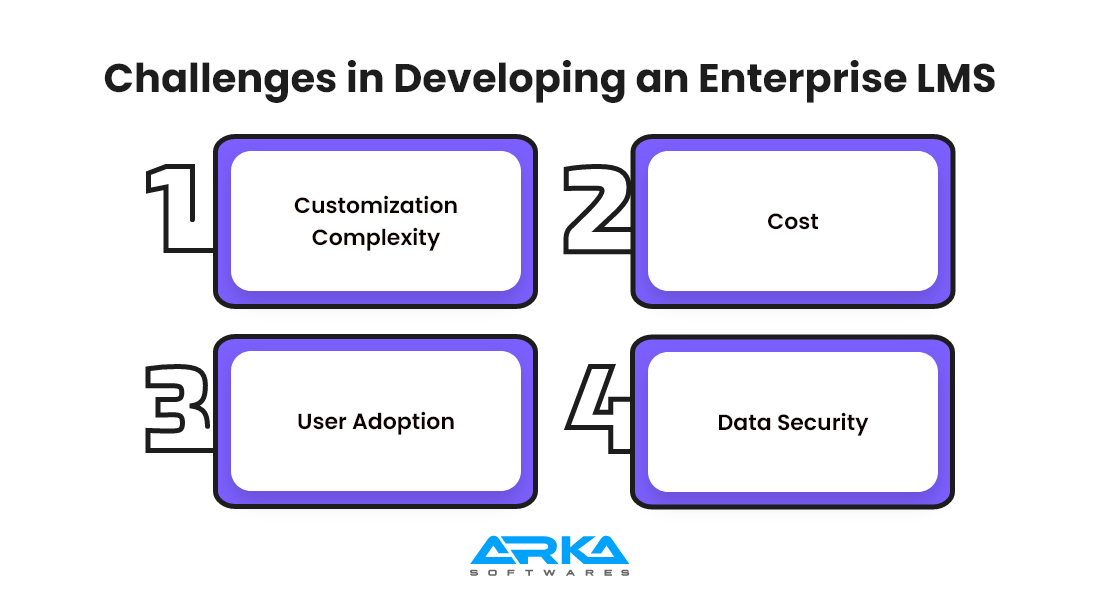
Several companies have successfully implemented Enterprise LMS systems to drive learning and development:
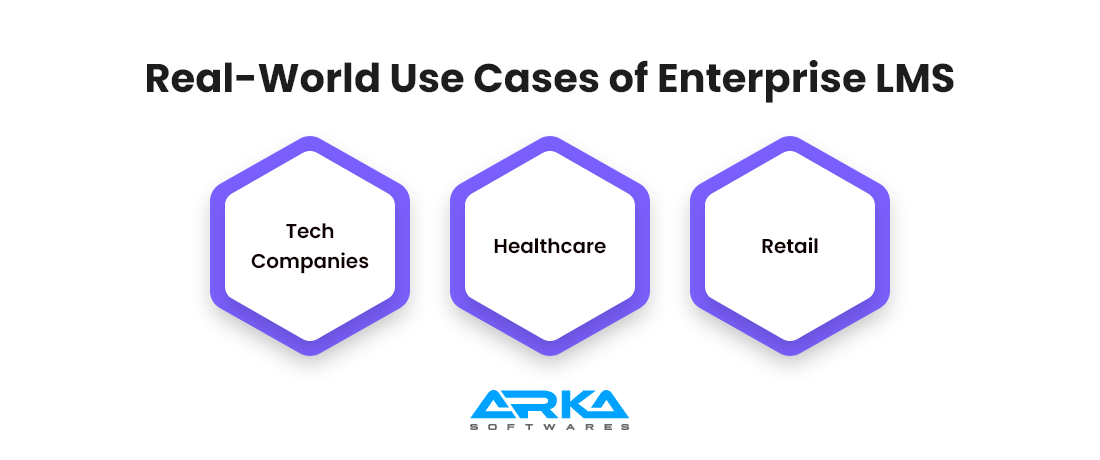
The implementation costs of enterprise LMS range from $90,000 to $300,000+, depending on the software complexity, the number of users and their locations, multilingual support, historical eLearning data migration, the scope of integrations, the use of AI and immersive technologies, and more.
Enterprise Learning Management Systems are essential tools for organizations seeking to foster employee development and improve training outcomes. Arka softwares as a LMS Development company, you can develop the right features, integrations, and a user-friendly interface.
A custom LMS can drive employee engagement, productivity, and business success. However, careful consideration of challenges, costs, and customization requirements is necessary to ensure a successful implementation.
To evolve an LMS for emerging organizations, ensure scalability, integrate new technologies, prioritize flexibility for customization, and adopt cloud-based systems. Regular feedback loops, data analytics, and continuous updates should be part of the strategy to meet the organization’s changing needs.
In LMS development, follow strong data encryption protocols and ensure compliance with GDPR, CCPA, and other relevant privacy regulations. Implement role-based access control, secure data storage, and regular audits. User consent and transparent privacy policies are key to maintaining user privacy throughout the LMS lifecycle.
The development and deployment of an enterprise LMS typically takes 6 to 12 months, depending on complexity, customization, and integration needs. This includes planning, design, development, testing, and deployment phases, followed by post-launch adjustments and training.
Post-launch maintenance includes bug fixes, system updates, performance optimization, security patches, content updates, user training, and technical support. It ensures that the LMS remains functional, secure, and adaptable to the organization’s evolving needs.
The cost of developing an enterprise LMS can range from $50,000 to $500,000+, depending on features, customization, integrations, and scale. Development time, user capacity, and ongoing support contribute to the overall budget.
Future trends include AI-powered personalized learning, gamification, mobile-first design, integrated social learning tools, and microlearning. The shift to cloud-based solutions, data-driven insights, and enhanced user experience through VR/AR will also transform how enterprise LMS platforms are used.